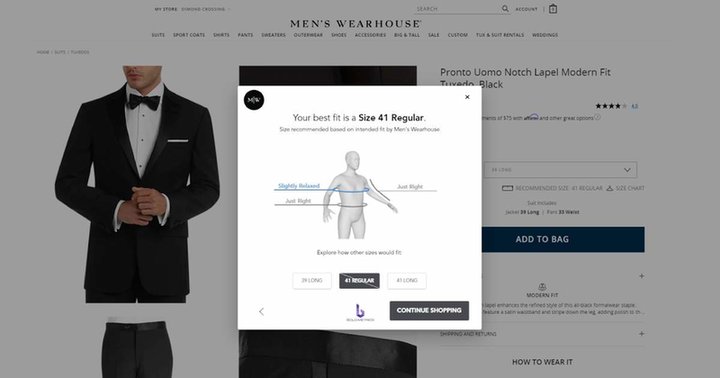
To In(Fit)Nity and Beyond: 3 Ways Solving Sizing Drives Conversion and Personalization
Fit is at the very foundation of the apparel industry. When it comes to clothing, a good fit is an alchemy of art and mathematics. Ever since mass manufacturing transformed apparel fittings from a bespoke process to the culmination of averages based on archaic, biased and inaccurate data, fit and sizing has become the holy grail for the industry. By solving sizing, fashion is removing one of the biggest roadblocks to personalizing apparel retail at scale.
Here are 3 ways to create a fit-optimized retail experience that drives conversion and reduces returns.
The customer experience is critical for the apparel retail industry as it plays a major role in building brand loyalty and driving sales. A positive experience can lead to repeat customers, which drives growth and builds resilience. Personalizing the retail experience builds meaningful customer loyalty and increases shopper satisfaction through targeted product recommendations, tailored marketing campaigns, and customized customer service. By understanding and catering to the unique needs and preferences of customers, businesses build trust and loyalty, which can lead to higher Average Order Value (AOV) and longer term lifetime values.
Men’s Wearhouse, for example, has instilled confidence in customers shopping for apparel online via data-driven algorithms to personalize best fit recommendations for its online tuxedo rentals. The result is a high conversion rate and 47.4% average reduction in returns for tuxedo coats, pants and shirts due to fit. Customers, buoyed by trust and consumer confidence for a tailored product that necessitates a good fit, are happy to transact.
1: Crush it when it comes to customer trust and confidence

2: Make online shopping easy… and intuitive
3: Leverage AI solutions to benefit your brand
Without a solid ‘fit foundation”, apparel brands will never achieve their full potential. With AI, apparel brands can unlock the power of body data to optimize operations and meet the demands of today's increasingly personalized world.
To ensure customer satisfaction for apparel eCommerce, brands should focus on providing a seamless customer journey. Particularly for a first-time customer or if a new product line hits the market, providing a personalized experience for a customer's journey in understanding their fit and sizing is paramount. Fitting technology solutions that embed body-relative data allow shoppers to understand exactly how a product would fit on them before they make a purchase, resulting in fewer returns and an innovative way for customers to engage with the brand. Pay close attention in making your sizing tools easy to find and use. Solutions won’t work if your customers can’t locate them easily or require too many arduous steps to engage with the solution.
Without a solid ‘fit foundation”, apparel brands will never achieve their full potential. Think about the last time you purchased clothing online - chances are you spent precious time deciphering size charts, trawling through user reviews and then still ended up guessing at your best size. Worse -buying a few different sizes if the return policies were lax enough to encourage bracketing. A frustrating online retail experience comes at a tremendous cost to the brand. Apparel brands looking to win with customers and drive meaningful conversion and repeat business, need to get their A-game on when it comes to fit and sizing.
AI enables brands to create a scalable way to generate and collect accurate customer body data to drive insights that can inform everything from design to distribution. Consumer data focused on fit and sizing creates patterns that brands can use to discern how actual customer body measurements relate to preferred fit. Data-led technical design means product innovation is accelerated to enable the manufacturing of apparel that fits according to your customer’s body shape, fit preferences, and demand. The impact cannot be underestimated - instead of fit models that do not accurately represent your customer base, brands can leverage the data insights to personalize the retail experience according to actual customer data. Relating customer body data to sizing gradations can also be utilized to understand your brand’s fit coverage for certain geographical cohorts in addition to questions around sizing inclusivity. The business impact of fewer returns has an important quantifiable impact on sustainability. Consumers don’t just want a better experience, they want better brands, and solving sizing with AI is a data-driven step in the right direction.




Daina Burnes is the Founder and CEO of Bold Metrics, Inc, a leading AI-driven retail fit technology company headquartered in San Francisco, California.
Bold Metrics uses AI to empower apparel brands to reduce returns, boost conversions and improve sustainability. Bold Metrics provides a scalable way for brands to predict customer body measurements accurately while connecting customers to better-fitting clothing, and generating powerful, actionable insights to supercharge the supply chain and reduce environmental impact. From size recommendations that leverage body shape and fit preference, to enterprise-grade solutions that optimise manufacturing from design to distribution, Bold Metrics improves the customer experience both in-store and online and is used by trusted brands to reduce fit-related returns.
A trailblazer in the field, Daina brings more than a decade of experience in growing and developing technology companies focused on harnessing and processing complex data and AI. As a published author in multiple leading research journals, Daina is also in demand as a keynote speaker on machine learning-based retail innovation and data analysis in the apparel industry. An active angel investor of technology startups, Daina is a mentor for startup accelerator programs including Techstars and IgniteNI where she advises burgeoning tech companies on their financing and product development strategies.